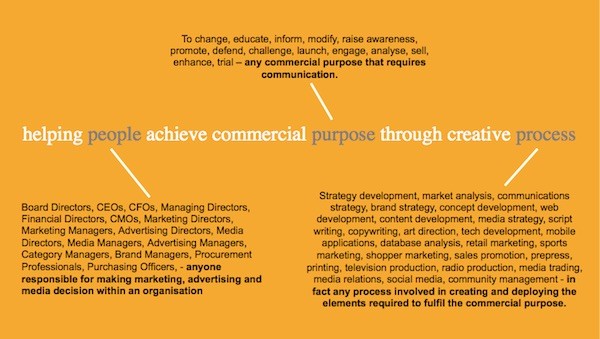If there is a centre of optimism in any business, there is a strong argument for why this is marketing. Marketing is future facing, customer focused and growth driving. No wonder Peter Drucker observed “Because the purpose of business is to create a customer, the business enterprise has two–and only two–basic functions: marketing and innovation. Marketing and innovation produce results; all the rest are costs”.
But what if your marketing function in your organisation is not future facing, customer focused and driving growth? What if it is simply the ‘colouring in department’ responsible for promotions and sales support material? Then it is highly likely you are missing out on a key output of optimism – that is defining the successful future for your business.
Optimism is confidence in the future and future success. Where is this more present than in the marketing function?
Marketing strategy is future facing.
While sales capitalize on maximising the value of the customer today, marketing focuses on identifying and creating future customers, next week, next month and next year. By researching and analyzing the market, the customer, evaluating the category trends for the product or services offered, reviewing the existing and emerging competitive set and understanding the channels and logistics of the business, marketing is focusing on the future success of the business in the short, medium and longer term.
So how do you build optimism for the future in your business? Make sure your marketing function is working with sales, not for sales, in developing marketing plans and strategies for the future.
Simply confining marketing to supporting the conversion of existing sales leads, smothers the possibility for marketing to contribute to future business opportunities. So why not review your marketing plan and make sure your marketing has an optimistic view for your business future.
Marketing is customer focused.
The purpose of marketing is to create customers. The purpose of sales is to maximise the value of those customers by satisfying the demand created by marketing. Rather than talking about Sales and Marketing, business should be referring to Marketing and Sales as marketing comes before sales in building awareness with customers, creating preference and demand for the brand of products and services in a competitive market.
While Sales will often “fish where the fish are biting”, that is put their efforts where they see the fastest and easiest result, who is looking for the other customer opportunities?
Marketers do this by developing a deep and broad understanding of the customer to identify and develop expanded and extended customer opportunities for the business. This could be from changes in the category, competitive set or the marketplace, which has impacted on customers in a way unseen at the sales level.
Marketing drives growth.
The mistake often made is that just because sales may close the sale with the customer, that does not mean marketing did not contribute to that sale, and the repeat sales that will come from that customer. Many businesses make the mistake that marketing simply supports sales, reducing the marketing team to simply preparing sales support materials for the sales force.
In fact, marketing is much more effective at laying the groundwork for sales to optimise the sales function by creating brand awareness and preference in potential new customers and reinforcing brand choice in existing customers, leading to repeat purchase.
James Cash Penney, founder of JC Penney famously said, “Growth is never by mere chance; it is the result of forces working together.” Your two most important growth engines for your business are Marketing and Sales. While your Sales team will be responding to the immediate and tactical needs of your customers, your Marketing team should be developing and implementing medium to longer term strategies to generate the future leads for sales based on their research and the input of the sales team.
If marketing is not the driver of optimism within your organisation, then it could be that you have not really created a high performing marketing function. Marketing works best when it is future focused, customer centric and driving growth. Too often marketing is seen to underperform in performance and delivering results. But when you focus marketing on what it does best, then the whole business has cause to be optimistic.
This article first appeared on the First5000 on February 28, 2020
Is your marketing strategy supporting the business goals and objectives? Find out more about our qualitative and quantitative approach here




